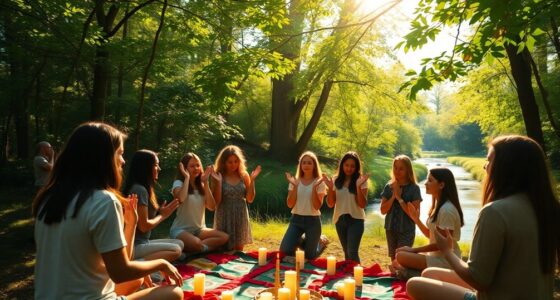At a men's retreat, you can engage in activities that foster relaxation and growth like guided meditation, breathwork, and sharing circles. These create a safe space for open expression and emotional healing. Consider incorporating outdoor activities like hiking or fishing for a deeper connection with nature and each other. Workshops on personal development can help you set goals while enhancing emotional intelligence. Team-building exercises promote communication and camaraderie. Don't forget stress relief techniques like yoga and deep breathing exercises to unwind. Exploring these elements can lead to a transformative experience that nourishes your mind and spirit. There's much more to discover!
Key Takeaways
- Incorporate mindfulness practices such as meditation and breathwork to enhance relaxation and emotional clarity among participants.
- Organize team-building exercises and discussion groups to promote open communication and foster meaningful connections.
- Include outdoor activities like hiking or fishing to encourage bonding and connect participants with nature for stress relief.
- Offer workshops focused on personal development, such as identifying values and setting goals, to support individual growth.
- Utilize relaxation techniques like deep breathing exercises and aromatherapy to create a calming environment conducive to healing and self-discovery.
Deepening Friendships and Camaraderie
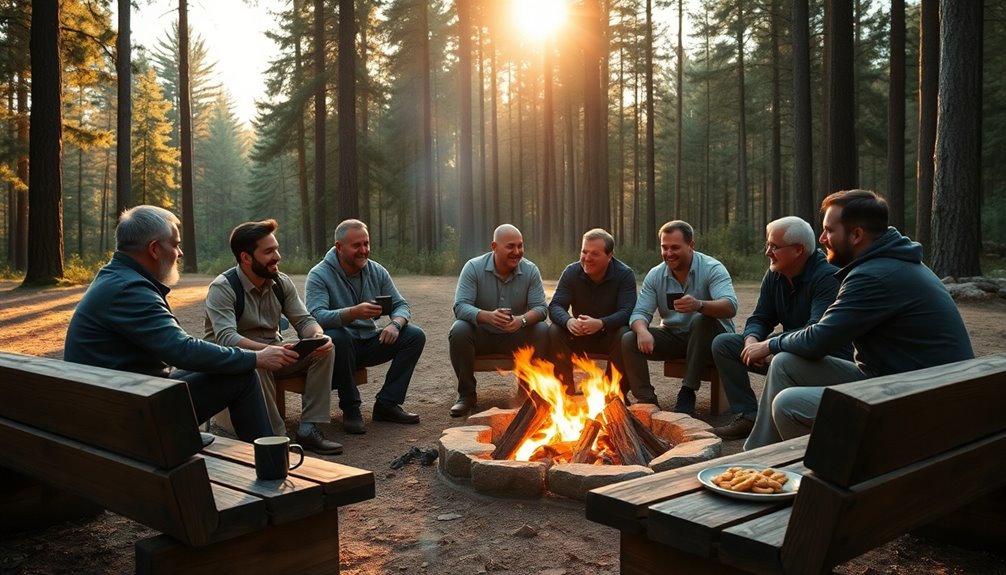
Deepening friendships and camaraderie is crucial for creating lasting connections among men during a retreat. Engaging in team-building exercises, like trust-building activities or group hikes, fosters collaboration and mutual support. Understanding how to navigate relationships, especially those with narcissistic behavior, can enhance the depth of conversations and connections formed during these activities.
You can also participate in discussion groups or sharing circles that encourage open communication and vulnerability. Workshops on topics like photography or yoga can create shared experiences that bind you together. Incorporating outdoor activities such as fishing or pool sessions facilitates bonding in a relaxed atmosphere.
Plan game nights with poker or cards against humanity to spark laughter and connection. Outdoor activities, such as fishing or pool sessions, facilitate bonding in a relaxed atmosphere.
Emotional Support and Safety
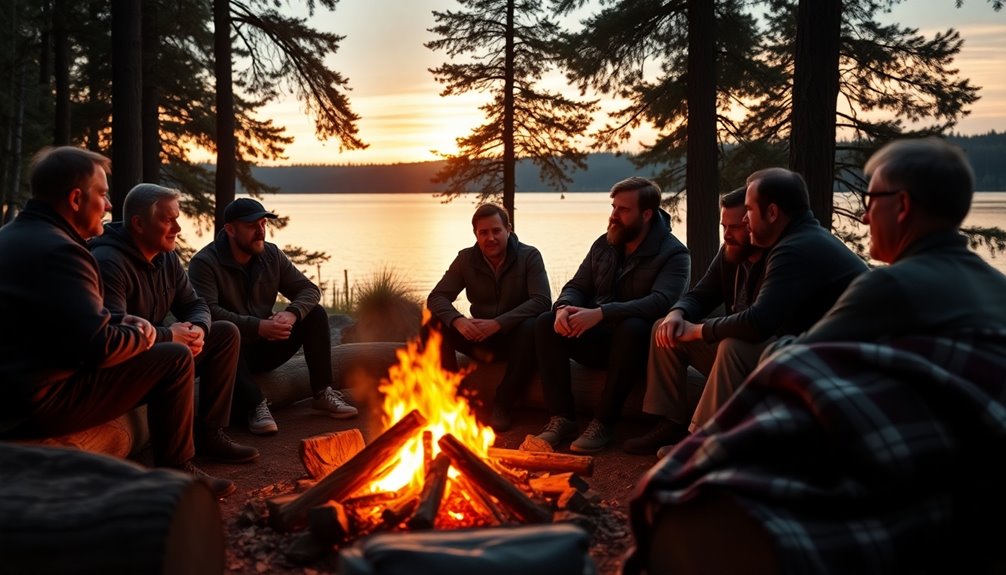
Building strong friendships sets the stage for emotional support and safety during a men's retreat.
You'll find a safe environment for expression through guided practices like meditation and breathwork, allowing you to share emotions constructively. Additionally, these practices can help mitigate the physical effects of stress, fostering overall well-being.
Group sharing circles establish a judgment-free space, where mutual agreements ensure respect among participants.
Facilitators model vulnerability by sharing their experiences, creating an atmosphere of equality.
Activities like ice baths and howling help you release pent-up emotions, promoting healing.
As you explore unresolved wounds and listen to others, you'll normalize vulnerability, breaking down the stigma around expressing feelings.
This holistic approach fosters deeper connections and encourages a healthier understanding of masculinity, making it easier to embrace authenticity and compassion. Additionally, participants often engage in deep emotional exploration, which supports their journey toward healing and personal growth.
Personal Growth Opportunities
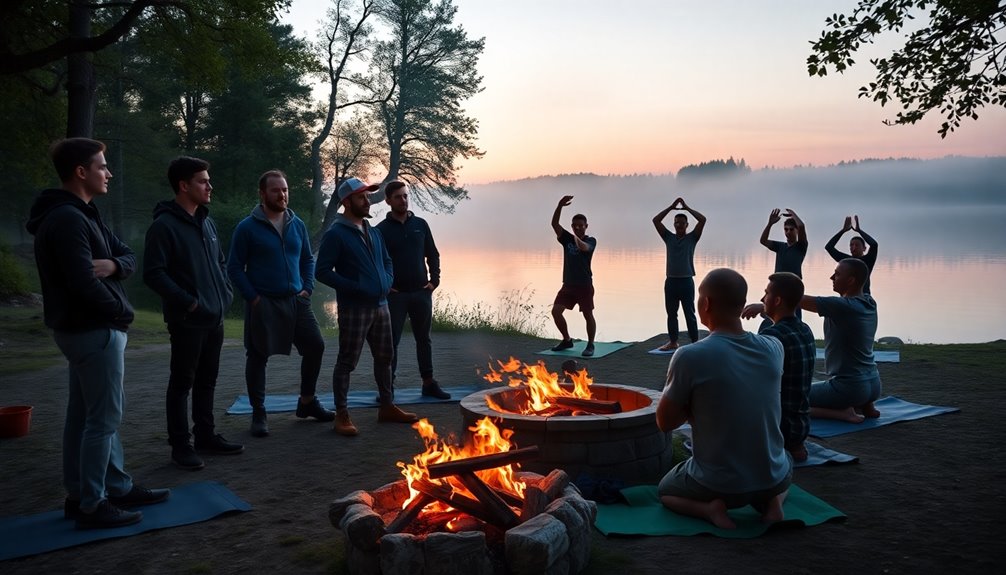
While you're on a men's retreat, you'll discover a wealth of personal growth opportunities designed to enhance your self-awareness and resilience.
Engage in workshops and group discussions that help you identify your values and set meaningful goals. Participate in mindfulness exercises to cultivate mental clarity and emotional well-being.
Explore archetypal work, allowing you to connect with different aspects of your masculinity. Dive into personal development activities that boost your emotional intelligence and communication skills. Additionally, these retreats often include personal development workshops focused on values and motivations, providing a structured approach to self-discovery. Embracing these challenges can cultivate resilience through adversity, which is essential for personal growth.
Finally, immerse yourself in nature—these experiences not only ground you but also provide a space for reflection. The tranquility of natural surroundings can enhance your well-being and inspire creativity. Consider incorporating elements of this serenity into your living space, exploring spa interior design ideas that reflect the calming aesthetics of nature. From soothing color palettes to the use of natural materials, these designs can create a sanctuary that promotes relaxation and mindfulness in your daily life.
Together, these opportunities foster significant personal growth, empowering you to navigate life with greater intention and purpose.
Stress Relief Techniques
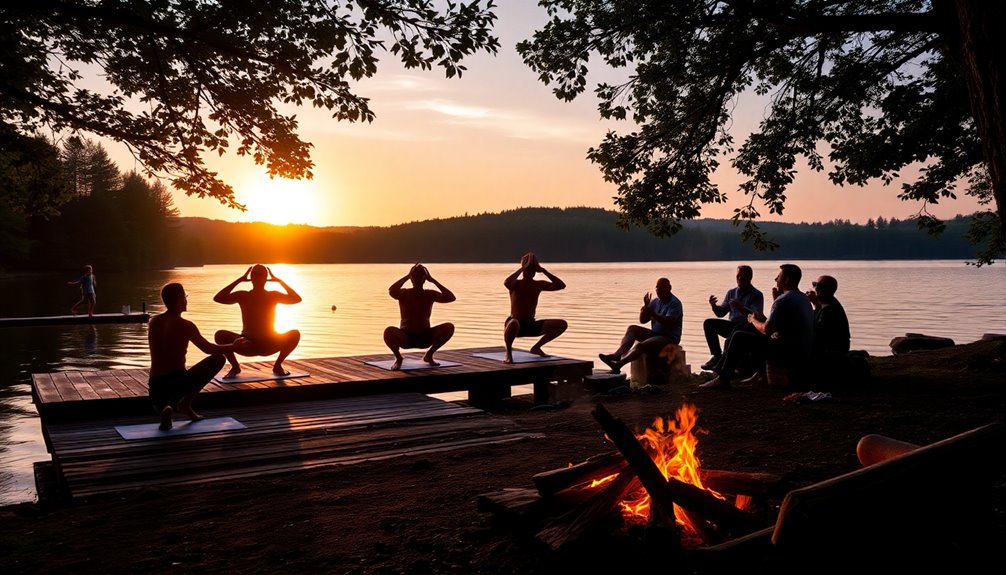
Stress relief techniques are essential for managing the pressures of daily life, especially during a men's retreat. You can start with deep breathing exercises, like diaphragmatic breathing, to promote relaxation. Breathwork techniques can significantly enhance your overall well-being and help alleviate anxiety.
Try combining this with aromatherapy for an enhanced experience, as certain essential oils like eucalyptus oil can act as powerful decongestants and promote easier breathing. Meditation and mindfulness are also effective; consider guided sessions or incorporating them into yoga practices. Engaging in physical activities like yoga or hiking allows you to connect with nature and your body. Spa activities, such as sauna sessions or hot tubs, can help you unwind and bond with others.
Finally, sharing circles create a judgment-free space for open discussions, fostering connection and emotional relief. Embrace these techniques to rejuvenate your body and mind during the retreat.
Communication Skill Enhancement
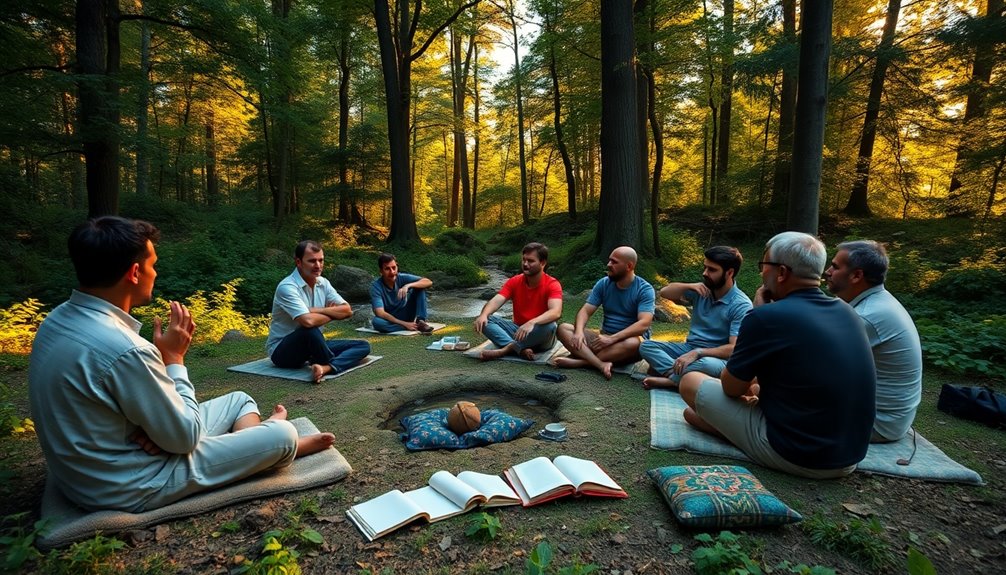
Effective communication is vital for fostering connections and understanding during a men's retreat. Start by practicing active listening; engage mindfully with others' thoughts and emotions without judgment.
Use effective questioning techniques, asking "What?" and "How?" to encourage deeper exploration of feelings. Create a safe space where vulnerability is welcomed, allowing you to express your authentic self. Incorporating trust-building activities can further enhance the sense of safety and connection among participants.
Cultivating emotional intelligence helps you recognize biases and promote openness among peers. Emphasize curiosity over conviction, fostering empathic communication that values understanding. Incorporating self-awareness can significantly enhance this process, allowing participants to better understand their own emotional responses.
Incorporate practical tools like conflict resolution strategies and mindfulness practices to enhance your skills. By focusing on self-awareness and genuine engagement, you'll build stronger, more meaningful connections throughout the retreat.
Fostering Brotherhood and Community
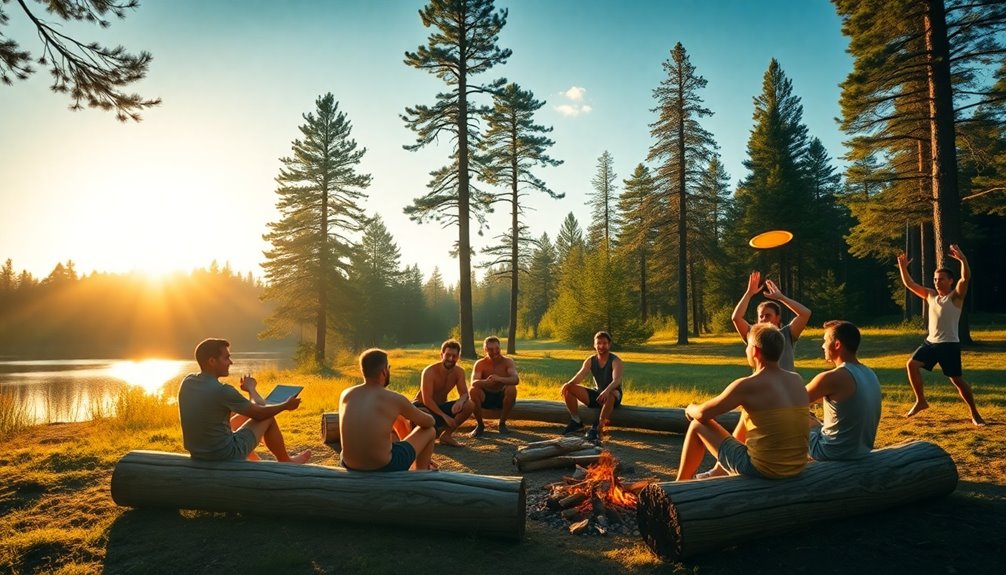
Building on the foundation of strong communication skills, fostering brotherhood and community during a men's retreat creates an environment where connections can thrive.
To strengthen bonds, engage in shared experiences like team-building exercises, camp projects, or lawn games. Encourage laughter and inside jokes to enhance camaraderie. Additionally, these activities are designed to promote accountability and support within male groups, deepening the sense of brotherhood.
Deep reflection sessions allow you to share personal stories and grow closer as a group. Plan reunion nights to renew connections and establish accountability partners for ongoing support.
Create opportunities for new connections, especially for newer members, and define chapter priorities to shape your group's future.
Mindfulness and Reflection Activities
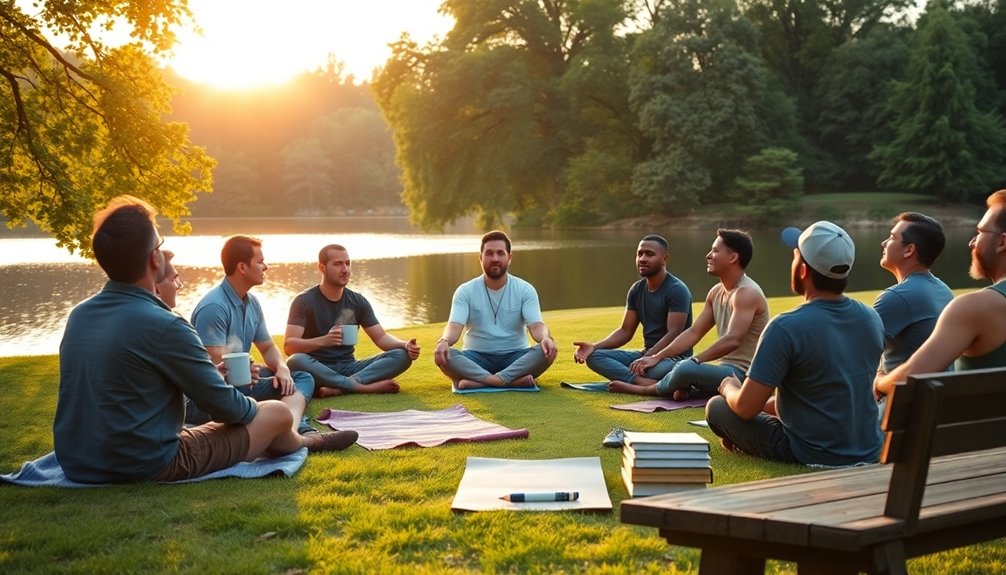
While you're at the men's retreat, incorporating mindfulness and reflection activities can significantly enhance your experience.
Start with guided meditation practices in serene settings like Redwood forests, where experienced facilitators help you center your thoughts and intentions. Engage in mindfulness exercises, such as observing a leaf or feeling the sensations of your body against a chair, to clear your mind and embrace the present moment. Many retreats also focus on spiritual growth, providing participants with valuable tools for their journey.
Breathwork and gentle yoga deepen your physical awareness and emotional release, promoting clarity and balance. Additionally, the retreat emphasizes emotional healing, making it a nurturing space for personal growth and connection among participants.
Lastly, participate in group sharing circles, creating a safe space to express emotions and foster connection. Together, these activities cultivate self-awareness and inner peace, enriching your retreat journey. In addition, consider incorporating mindfulness exercises and guided meditations into your schedule, as these practices can deepen your participants’ reflective experiences. Along with these activities, it’s crucial to include some time for personal reflection, allowing individuals to process their thoughts and feelings. Utilizing these executive retreat planning tips will not only enhance the overall experience but also ensure that every participant leaves feeling rejuvenated and connected to themselves and each other.
Frequently Asked Questions
What Should I Bring to a Men's Retreat?
When you're preparing for a men's retreat, think about comfort and practicality. Bring seasonal clothing, comfortable shoes, and activewear for activities.
Don't forget your toiletries, sunscreen, and any necessary medications. For downtime, pack a book, journal, or some games for entertainment.
If you're heading outdoors, include a water bottle, snacks, and any specific gear for hiking or camping.
These essentials will help you enjoy the experience while staying relaxed and prepared.
How Long Does a Typical Men's Retreat Last?
A typical men's retreat usually lasts 1 to 2 days, often kicking off on Friday night and wrapping up by Sunday morning.
Some retreats are shorter, but weekend formats are popular. If you're looking for something more immersive, extended options can last 3 to 5 days.
Regardless of duration, expect a mix of meals, workshops, and activities designed to foster connection and growth among participants.
Flexibility in scheduling allows for a customized experience.
Are Retreats Suitable for All Age Groups?
Yes, retreats can be suitable for all age groups, depending on the specific type of retreat and its activities.
You'll find options that cater to different age ranges, from spiritual to fitness retreats. Many activities, like workshops and nature hikes, are designed for inclusivity.
Just be sure to check any age restrictions or accompaniment requirements, as some retreats may have specific guidelines for younger participants or those needing support.
Is Prior Experience in Activities Required?
You might think prior experience is crucial, but it's not. Many activities at retreats are designed for everyone, regardless of skill level.
You'll find yoga, meditation, and team-building exercises that require no background knowledge. Experienced facilitators guide you through workshops, creating a supportive environment.
This inclusivity allows you to learn, grow, and connect without feeling intimidated, making the experience enriching whether you're a beginner or more seasoned participant.
Can I Attend Alone or Should I Bring a Friend?
You can absolutely attend alone or bring a friend, depending on what you're comfortable with.
Going solo allows for deep self-reflection and personal growth, while having a friend can enhance your experience through shared support and bonding.
Consider what you hope to achieve during the retreat. If you seek solitude and introspection, going alone might be best. If you want shared experiences, inviting a friend could be the way to go.
Conclusion
As you consider these retreat ideas, remember that stepping away from daily life doesn't mean you're neglecting responsibilities. Instead, it's an investment in yourself and your relationships. You'll return refreshed, with deeper connections and newfound skills to tackle challenges. Embrace the chance to unwind, grow, and foster true brotherhood. So, gather your friends, dive into these activities, and watch how a little time together can transform your lives for the better. You deserve it!





